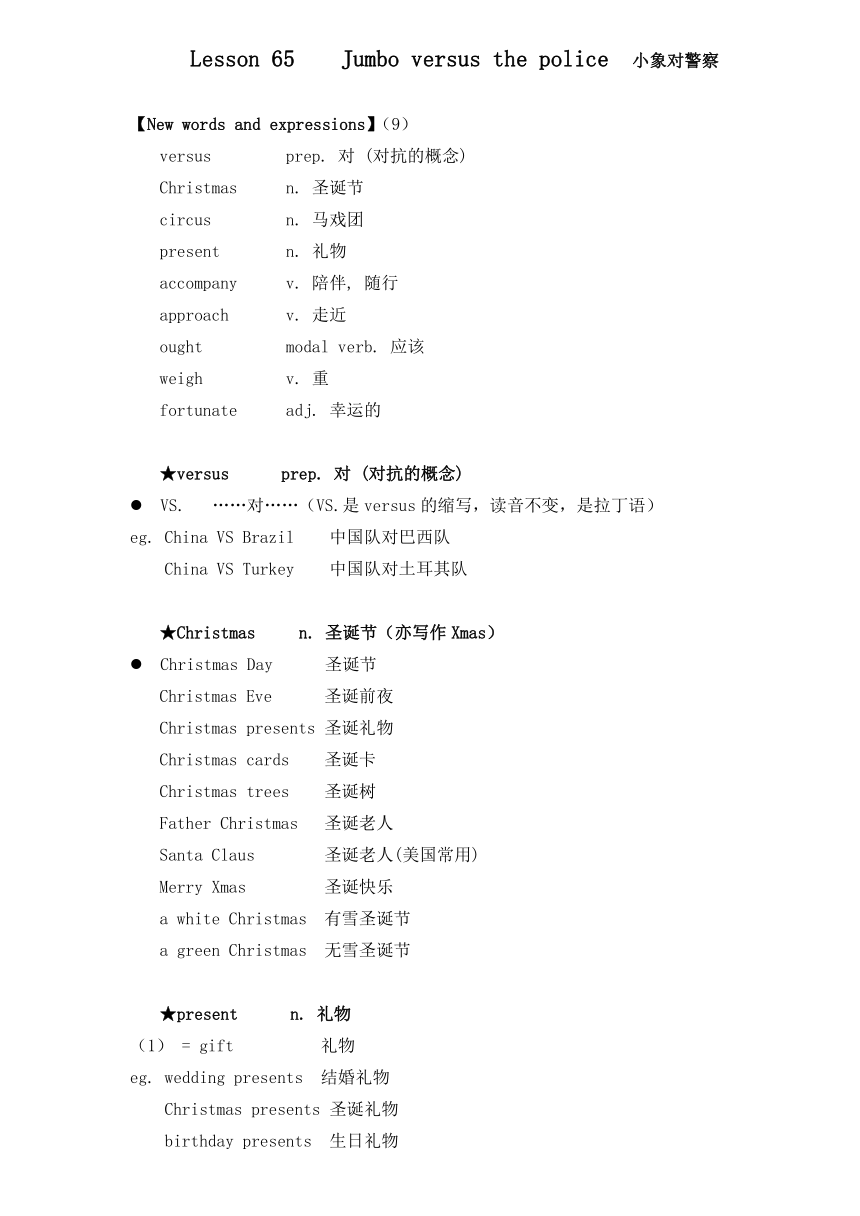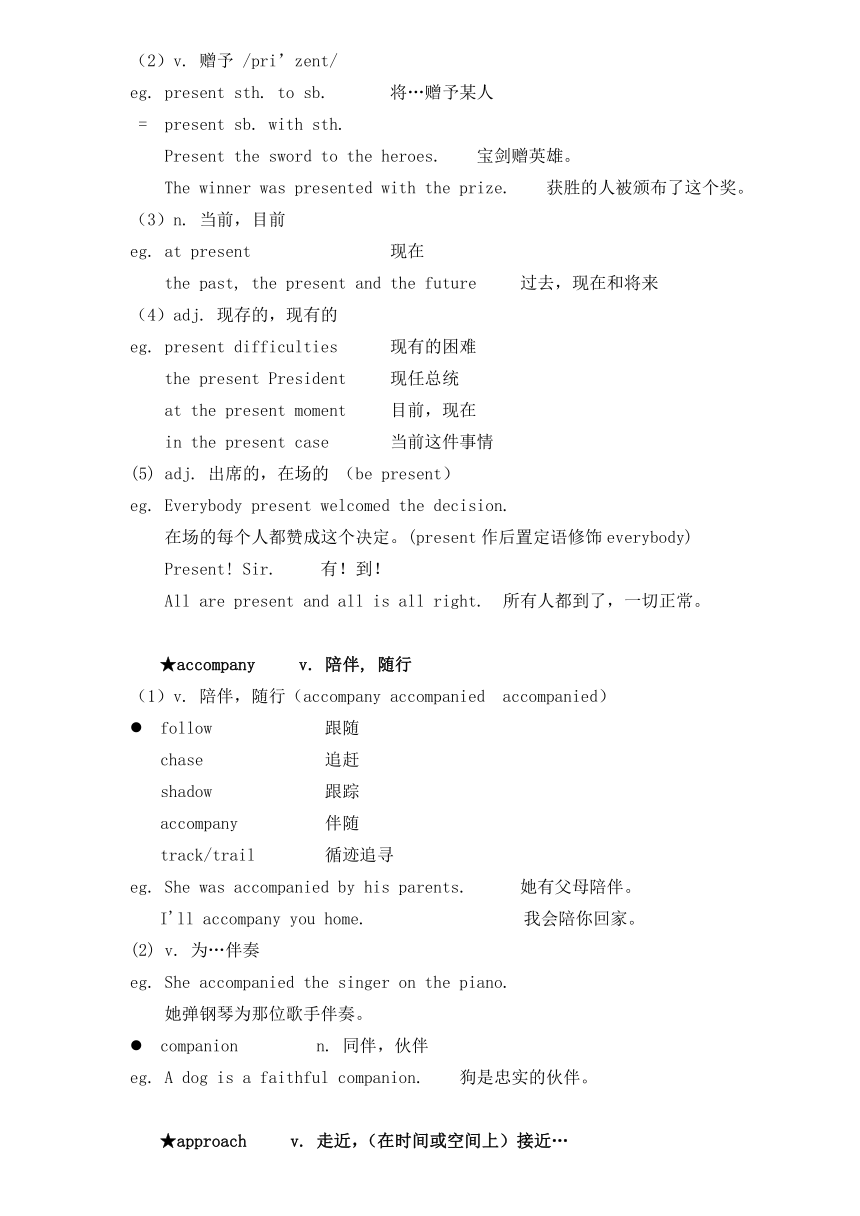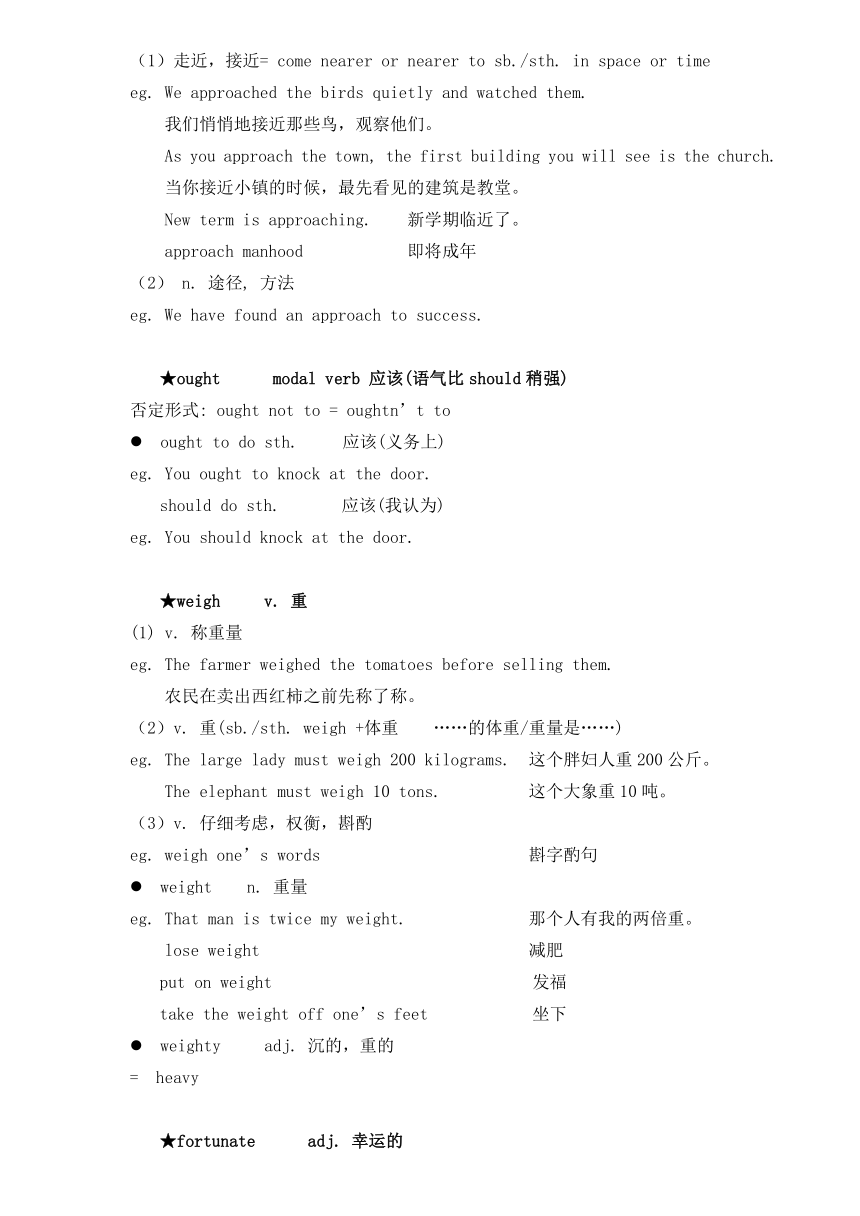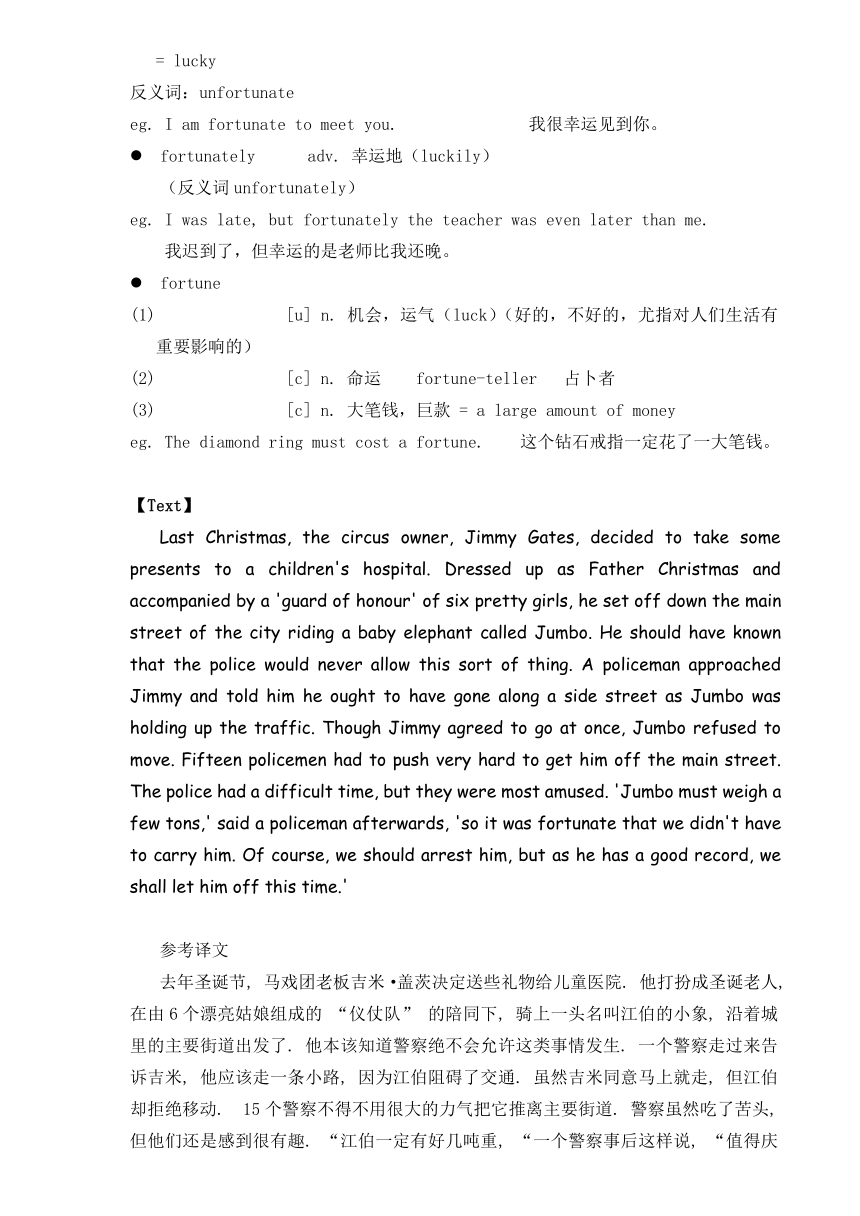新概念英语二册Lesson 65 Jumbo versus the police 超详教案讲义笔记
文档属性
| 名称 | 新概念英语二册Lesson 65 Jumbo versus the police 超详教案讲义笔记 |  | |
| 格式 | docx | ||
| 文件大小 | 33.5KB | ||
| 资源类型 | 教案 | ||
| 版本资源 | 新概念英语 | ||
| 科目 | 英语 | ||
| 更新时间 | 2023-09-26 06:36:54 | ||
图片预览




文档简介
Lesson 65 Jumbo versus the police 小象对警察
【New words and expressions】(9)
versus prep. 对 (对抗的概念)
Christmas n. 圣诞节
circus n. 马戏团
present n. 礼物
accompany v. 陪伴, 随行
approach v. 走近
ought modal verb. 应该
weigh v. 重
fortunate adj. 幸运的
★versus prep. 对 (对抗的概念)
VS. ……对……(VS.是versus的缩写,读音不变,是拉丁语)
eg. China VS Brazil 中国队对巴西队
China VS Turkey 中国队对土耳其队
★Christmas n. 圣诞节(亦写作Xmas)
Christmas Day 圣诞节
Christmas Eve 圣诞前夜
Christmas presents 圣诞礼物
Christmas cards 圣诞卡
Christmas trees 圣诞树
Father Christmas 圣诞老人
Santa Claus 圣诞老人(美国常用)
Merry Xmas 圣诞快乐
a white Christmas 有雪圣诞节
a green Christmas 无雪圣诞节
★present n. 礼物
(1) = gift 礼物
eg. wedding presents 结婚礼物
Christmas presents 圣诞礼物
birthday presents 生日礼物
(2)v. 赠予 /pri’zent/
eg. present sth. to sb. 将…赠予某人
= present sb. with sth.
Present the sword to the heroes. 宝剑赠英雄。
The winner was presented with the prize. 获胜的人被颁布了这个奖。
(3)n. 当前,目前
eg. at present 现在
the past, the present and the future 过去,现在和将来
(4)adj. 现存的,现有的
eg. present difficulties 现有的困难
the present President 现任总统
at the present moment 目前,现在
in the present case 当前这件事情
(5) adj. 出席的,在场的 (be present)
eg. Everybody present welcomed the decision.
在场的每个人都赞成这个决定。(present作后置定语修饰everybody)
Present! Sir. 有!到!
All are present and all is all right. 所有人都到了,一切正常。
★accompany v. 陪伴, 随行
(1)v. 陪伴,随行(accompany accompanied accompanied)
follow 跟随
chase 追赶
shadow 跟踪
accompany 伴随
track/trail 循迹追寻
eg. She was accompanied by his parents. 她有父母陪伴。
I'll accompany you home. 我会陪你回家。
(2) v. 为…伴奏
eg. She accompanied the singer on the piano.
她弹钢琴为那位歌手伴奏。
companion n. 同伴,伙伴
eg. A dog is a faithful companion. 狗是忠实的伙伴。
★approach v. 走近,(在时间或空间上)接近…
(1)走近,接近= come nearer or nearer to sb./sth. in space or time
eg. We approached the birds quietly and watched them.
我们悄悄地接近那些鸟,观察他们。
As you approach the town, the first building you will see is the church.
当你接近小镇的时候,最先看见的建筑是教堂。
New term is approaching. 新学期临近了。
approach manhood 即将成年
(2) n. 途径, 方法
eg. We have found an approach to success.
★ought modal verb 应该(语气比should稍强)
否定形式: ought not to = oughtn’t to
ought to do sth. 应该(义务上)
eg. You ought to knock at the door.
should do sth. 应该(我认为)
eg. You should knock at the door.
★weigh v. 重
(1) v. 称重量
eg. The farmer weighed the tomatoes before selling them.
农民在卖出西红柿之前先称了称。
(2)v. 重(sb./sth. weigh +体重 ……的体重/重量是……)
eg. The large lady must weigh 200 kilograms. 这个胖妇人重200公斤。
The elephant must weigh 10 tons. 这个大象重10吨。
(3)v. 仔细考虑,权衡,斟酌
eg. weigh one’s words 斟字酌句
weight n. 重量
eg. That man is twice my weight. 那个人有我的两倍重。
lose weight 减肥
put on weight 发福
take the weight off one’s feet 坐下
weighty adj. 沉的,重的
= heavy
★fortunate adj. 幸运的
= lucky
反义词:unfortunate
eg. I am fortunate to meet you. 我很幸运见到你。
fortunately adv. 幸运地(luckily)
(反义词unfortunately)
eg. I was late, but fortunately the teacher was even later than me.
我迟到了,但幸运的是老师比我还晚。
fortune
[u] n. 机会,运气(luck)(好的,不好的,尤指对人们生活有重要影响的)
[c] n. 命运 fortune-teller 占卜者
[c] n. 大笔钱,巨款 = a large amount of money
eg. The diamond ring must cost a fortune. 这个钻石戒指一定花了一大笔钱。
【Text】
Last Christmas, the circus owner, Jimmy Gates, decided to take some presents to a children's hospital. Dressed up as Father Christmas and accompanied by a 'guard of honour' of six pretty girls, he set off down the main street of the city riding a baby elephant called Jumbo. He should have known that the police would never allow this sort of thing. A policeman approached Jimmy and told him he ought to have gone along a side street as Jumbo was holding up the traffic. Though Jimmy agreed to go at once, Jumbo refused to move. Fifteen policemen had to push very hard to get him off the main street. The police had a difficult time, but they were most amused. 'Jumbo must weigh a few tons,' said a policeman afterwards, 'so it was fortunate that we didn't have to carry him. Of course, we should arrest him, but as he has a good record, we shall let him off this time.'
参考译文
去年圣诞节, 马戏团老板吉米·盖茨决定送些礼物给儿童医院. 他打扮成圣诞老人, 在由6个漂亮姑娘组成的 “仪仗队” 的陪同下, 骑上一头名叫江伯的小象, 沿着城里的主要街道出发了. 他本该知道警察绝不会允许这类事情发生. 一个警察走过来告诉吉米, 他应该走一条小路, 因为江伯阻碍了交通. 虽然吉米同意马上就走, 但江伯却拒绝移动. 15个警察不得不用很大的力气把它推离主要街道. 警察虽然吃了苦头, 但他们还是感到很有趣. “江伯一定有好几吨重, “一个警察事后这样说, “值得庆幸的是它没让我们抬它走. 当然, 我们应该逮捕它, 但由于它一贯表现很好, 这次我们饶了它. “
【课文讲解】
1、Last Christmas, the circus owner, Jimmy Gates, decided to take some presents to a children's hospital.
Jimmy Gates 作the circus owner的同位语
the circus owner 马戏团老板
at the circus 在马戏团
take…to 带到……去
bring…from 从…带来
2、Dressed up as Father Christmas and accompanied by a 'guard of honour' of six pretty girls, he set off down the main street of the city riding a baby elephant called Jumbo.
Dressed up as Father Christmas过去分词短语作伴随状语
accompanied by 过去分词短语作伴随状语
主句是he set off down the main street of the city 他沿着主干道出发了
set off 出发
riding a baby elephant 现在分词短语作伴随状语
called Jumbo中called是过去分词作定语修饰elephant
dress up as… 装扮成为……(的样子)
dress up 盛装,打扮
eg. We dressed up for the wedding. 我们盛装打扮去参加婚礼。
dress vt. (给人)穿上衣服
eg. She dressed her baby. 她给她的孩子穿衣服。
dress oneself in 穿着(表示动作)
eg. She dressed herself in a coat. 她穿了一件外套。
be dressed in 正穿着(表示状态)
eg. The lady was dressed in white at the party.
聚会上那位女士正穿着白衣服。
a guard of honour 仪仗队
of six pretty girls中的of表示“由……组成的”
set off down 沿着…出发
= set off along
set off for work 动身去上班
set off on a trip 踏上旅途
main street 主干道
the main dish 主菜
the main character in the play 戏中的主角
3、He should have known that the police would never allow this sort of thing.
should have done 原本应该发生而没发生
= ought to have done
allow v. 允许,许可
allow + n./doing
eg. I’ll never allow such behavior. 我不允许那样的行为。
We don’t allow smoking. 我们不允许吸烟。
= Smoking is not allowed here.
allow sb. to do sth. 允许…做…,听任…做…
注意:allow doing/ allow sb. to do
类似用法的词有:advise, allow, permit, recommend…
4、A policeman approached Jimmy and told him he ought to have gone along a side street as Jumbo was holding up the traffic.
a policeman (谓语为单数)
the police(谓语为复数)
ought to have done = should have done
a side street 小路——相对于main street
as=because
hold up
阻止,使延误,停顿
eg. hold up the traffic 阻碍交通
(2) 举起,拿起
eg. I held up my hand to show that I had a question.
我举起手表示我有问题。
(3)进入(某处)抢劫;拦截(人,车等)加以抢劫
eg. hold up a bank 抢劫银行
5、Though Jimmy agreed to go at once, Jumbo refused to move.
agree to do sth. 同意做某事(to 为不定式 )
eg. We all agreed to start at once. 我们都同意立刻出发。
agree that 承认
eg. He agreed that he should have been more careful.
他承认他本该更小心的。
agree to sth. 同意(某提议)
eg. I agreed to his proposal. 我同意他的建议。
agree on sth. 决定
eg. We agreed on a plan. 我们商量后决定某一计划。
agree with sb. 与…一致
eg. His story agrees with the facts. 他的陈述和事实相符。
refuse to do sth. 拒绝做…
6、Fifteen policemen had to push very hard to get him off the main street.
get off 从……移去/除去 (off=away from 离开什么地方)
eg. Please get the box off the boat.
7、The police had a difficult time, but they were most amused. 'Jumbo must weigh a few tons,' said a policeman afterwards, 'so it was fortunate that we didn't have to carry him. Of course, we should arrest him, but as he has a good record, we shall let him off this time.'
afterwards =later后来
It was fortunate that… 幸运的是……
record n. 纪录;(警察局的)记录,历史,成绩
eg. set up a new world record 创造一个新的世界纪录
sb. have a good record 表现一贯很好
Her record as a secretary in the firm isn’t very good.
let sb. off 饶恕某人,放过……,对……从轻处理
【Key structures】
Must, Have to, Should and Ought to
must通常只用于现在时和将来时,其他时态则用have to代替。have to比must往往更强调客观的要求或外在的原因。should和ought to都可译为“应该”,表示义务、责任或某个正确的行为。ought to比should语气略强些,多用于肯定句;疑问句与否定结构则多用should。should/ought to +have +过去分词表示过去应该做(或完成)而没有做的事。
当表过去某时不得不做了某事,只能用had to, 不能用must。
should/ought to 也可表“可能”
情态动词表示说话人对某种可能性感到的肯定或不肯定的程度,可以按照从最不肯定might到最肯定must列出来。
might< may< could< can< should< ought to< would< will< must
should have done, ought to have done
应该做(发生),实际上没做(发生)
【Special difficulties】
带let的短语
let vt. 允许,让
let sb. in 允许进来
The woman who let me in had a baby in her arms.
let sb. out 放走,释放,放出去
Every evening they let the dog out.
let off 放过,饶过,宽恕,对……从轻处理
I think we shall let him off this time. 我想这次我们饶了他。
The thief never dreamt that the police would let him off.
let down 使……失望,(在紧要关头)抛弃
They need your help. Don’t let them down.
He failed in the exam again and his parents left let down.
agree and accept
agree vi. 同意(计划、建议等),常与to和with连用
They invited me to their wedding and I’ve agreed to go.
accept vt. 接受,收受
She offered me some of her children’s clothes and I accepted them.
I don’t accept your opinion/ agree with your opinion.
dress and dress up
dress vt.&vt. 穿衣,打扮
Tom has nearly learned how to dress/dress himself now.
dress up 穿上盛装,精心打扮,装扮(成……)
He dressed up as Father Christmas.
【New words and expressions】(9)
versus prep. 对 (对抗的概念)
Christmas n. 圣诞节
circus n. 马戏团
present n. 礼物
accompany v. 陪伴, 随行
approach v. 走近
ought modal verb. 应该
weigh v. 重
fortunate adj. 幸运的
★versus prep. 对 (对抗的概念)
VS. ……对……(VS.是versus的缩写,读音不变,是拉丁语)
eg. China VS Brazil 中国队对巴西队
China VS Turkey 中国队对土耳其队
★Christmas n. 圣诞节(亦写作Xmas)
Christmas Day 圣诞节
Christmas Eve 圣诞前夜
Christmas presents 圣诞礼物
Christmas cards 圣诞卡
Christmas trees 圣诞树
Father Christmas 圣诞老人
Santa Claus 圣诞老人(美国常用)
Merry Xmas 圣诞快乐
a white Christmas 有雪圣诞节
a green Christmas 无雪圣诞节
★present n. 礼物
(1) = gift 礼物
eg. wedding presents 结婚礼物
Christmas presents 圣诞礼物
birthday presents 生日礼物
(2)v. 赠予 /pri’zent/
eg. present sth. to sb. 将…赠予某人
= present sb. with sth.
Present the sword to the heroes. 宝剑赠英雄。
The winner was presented with the prize. 获胜的人被颁布了这个奖。
(3)n. 当前,目前
eg. at present 现在
the past, the present and the future 过去,现在和将来
(4)adj. 现存的,现有的
eg. present difficulties 现有的困难
the present President 现任总统
at the present moment 目前,现在
in the present case 当前这件事情
(5) adj. 出席的,在场的 (be present)
eg. Everybody present welcomed the decision.
在场的每个人都赞成这个决定。(present作后置定语修饰everybody)
Present! Sir. 有!到!
All are present and all is all right. 所有人都到了,一切正常。
★accompany v. 陪伴, 随行
(1)v. 陪伴,随行(accompany accompanied accompanied)
follow 跟随
chase 追赶
shadow 跟踪
accompany 伴随
track/trail 循迹追寻
eg. She was accompanied by his parents. 她有父母陪伴。
I'll accompany you home. 我会陪你回家。
(2) v. 为…伴奏
eg. She accompanied the singer on the piano.
她弹钢琴为那位歌手伴奏。
companion n. 同伴,伙伴
eg. A dog is a faithful companion. 狗是忠实的伙伴。
★approach v. 走近,(在时间或空间上)接近…
(1)走近,接近= come nearer or nearer to sb./sth. in space or time
eg. We approached the birds quietly and watched them.
我们悄悄地接近那些鸟,观察他们。
As you approach the town, the first building you will see is the church.
当你接近小镇的时候,最先看见的建筑是教堂。
New term is approaching. 新学期临近了。
approach manhood 即将成年
(2) n. 途径, 方法
eg. We have found an approach to success.
★ought modal verb 应该(语气比should稍强)
否定形式: ought not to = oughtn’t to
ought to do sth. 应该(义务上)
eg. You ought to knock at the door.
should do sth. 应该(我认为)
eg. You should knock at the door.
★weigh v. 重
(1) v. 称重量
eg. The farmer weighed the tomatoes before selling them.
农民在卖出西红柿之前先称了称。
(2)v. 重(sb./sth. weigh +体重 ……的体重/重量是……)
eg. The large lady must weigh 200 kilograms. 这个胖妇人重200公斤。
The elephant must weigh 10 tons. 这个大象重10吨。
(3)v. 仔细考虑,权衡,斟酌
eg. weigh one’s words 斟字酌句
weight n. 重量
eg. That man is twice my weight. 那个人有我的两倍重。
lose weight 减肥
put on weight 发福
take the weight off one’s feet 坐下
weighty adj. 沉的,重的
= heavy
★fortunate adj. 幸运的
= lucky
反义词:unfortunate
eg. I am fortunate to meet you. 我很幸运见到你。
fortunately adv. 幸运地(luckily)
(反义词unfortunately)
eg. I was late, but fortunately the teacher was even later than me.
我迟到了,但幸运的是老师比我还晚。
fortune
[u] n. 机会,运气(luck)(好的,不好的,尤指对人们生活有重要影响的)
[c] n. 命运 fortune-teller 占卜者
[c] n. 大笔钱,巨款 = a large amount of money
eg. The diamond ring must cost a fortune. 这个钻石戒指一定花了一大笔钱。
【Text】
Last Christmas, the circus owner, Jimmy Gates, decided to take some presents to a children's hospital. Dressed up as Father Christmas and accompanied by a 'guard of honour' of six pretty girls, he set off down the main street of the city riding a baby elephant called Jumbo. He should have known that the police would never allow this sort of thing. A policeman approached Jimmy and told him he ought to have gone along a side street as Jumbo was holding up the traffic. Though Jimmy agreed to go at once, Jumbo refused to move. Fifteen policemen had to push very hard to get him off the main street. The police had a difficult time, but they were most amused. 'Jumbo must weigh a few tons,' said a policeman afterwards, 'so it was fortunate that we didn't have to carry him. Of course, we should arrest him, but as he has a good record, we shall let him off this time.'
参考译文
去年圣诞节, 马戏团老板吉米·盖茨决定送些礼物给儿童医院. 他打扮成圣诞老人, 在由6个漂亮姑娘组成的 “仪仗队” 的陪同下, 骑上一头名叫江伯的小象, 沿着城里的主要街道出发了. 他本该知道警察绝不会允许这类事情发生. 一个警察走过来告诉吉米, 他应该走一条小路, 因为江伯阻碍了交通. 虽然吉米同意马上就走, 但江伯却拒绝移动. 15个警察不得不用很大的力气把它推离主要街道. 警察虽然吃了苦头, 但他们还是感到很有趣. “江伯一定有好几吨重, “一个警察事后这样说, “值得庆幸的是它没让我们抬它走. 当然, 我们应该逮捕它, 但由于它一贯表现很好, 这次我们饶了它. “
【课文讲解】
1、Last Christmas, the circus owner, Jimmy Gates, decided to take some presents to a children's hospital.
Jimmy Gates 作the circus owner的同位语
the circus owner 马戏团老板
at the circus 在马戏团
take…to 带到……去
bring…from 从…带来
2、Dressed up as Father Christmas and accompanied by a 'guard of honour' of six pretty girls, he set off down the main street of the city riding a baby elephant called Jumbo.
Dressed up as Father Christmas过去分词短语作伴随状语
accompanied by 过去分词短语作伴随状语
主句是he set off down the main street of the city 他沿着主干道出发了
set off 出发
riding a baby elephant 现在分词短语作伴随状语
called Jumbo中called是过去分词作定语修饰elephant
dress up as… 装扮成为……(的样子)
dress up 盛装,打扮
eg. We dressed up for the wedding. 我们盛装打扮去参加婚礼。
dress vt. (给人)穿上衣服
eg. She dressed her baby. 她给她的孩子穿衣服。
dress oneself in 穿着(表示动作)
eg. She dressed herself in a coat. 她穿了一件外套。
be dressed in 正穿着(表示状态)
eg. The lady was dressed in white at the party.
聚会上那位女士正穿着白衣服。
a guard of honour 仪仗队
of six pretty girls中的of表示“由……组成的”
set off down 沿着…出发
= set off along
set off for work 动身去上班
set off on a trip 踏上旅途
main street 主干道
the main dish 主菜
the main character in the play 戏中的主角
3、He should have known that the police would never allow this sort of thing.
should have done 原本应该发生而没发生
= ought to have done
allow v. 允许,许可
allow + n./doing
eg. I’ll never allow such behavior. 我不允许那样的行为。
We don’t allow smoking. 我们不允许吸烟。
= Smoking is not allowed here.
allow sb. to do sth. 允许…做…,听任…做…
注意:allow doing/ allow sb. to do
类似用法的词有:advise, allow, permit, recommend…
4、A policeman approached Jimmy and told him he ought to have gone along a side street as Jumbo was holding up the traffic.
a policeman (谓语为单数)
the police(谓语为复数)
ought to have done = should have done
a side street 小路——相对于main street
as=because
hold up
阻止,使延误,停顿
eg. hold up the traffic 阻碍交通
(2) 举起,拿起
eg. I held up my hand to show that I had a question.
我举起手表示我有问题。
(3)进入(某处)抢劫;拦截(人,车等)加以抢劫
eg. hold up a bank 抢劫银行
5、Though Jimmy agreed to go at once, Jumbo refused to move.
agree to do sth. 同意做某事(to 为不定式 )
eg. We all agreed to start at once. 我们都同意立刻出发。
agree that 承认
eg. He agreed that he should have been more careful.
他承认他本该更小心的。
agree to sth. 同意(某提议)
eg. I agreed to his proposal. 我同意他的建议。
agree on sth. 决定
eg. We agreed on a plan. 我们商量后决定某一计划。
agree with sb. 与…一致
eg. His story agrees with the facts. 他的陈述和事实相符。
refuse to do sth. 拒绝做…
6、Fifteen policemen had to push very hard to get him off the main street.
get off 从……移去/除去 (off=away from 离开什么地方)
eg. Please get the box off the boat.
7、The police had a difficult time, but they were most amused. 'Jumbo must weigh a few tons,' said a policeman afterwards, 'so it was fortunate that we didn't have to carry him. Of course, we should arrest him, but as he has a good record, we shall let him off this time.'
afterwards =later后来
It was fortunate that… 幸运的是……
record n. 纪录;(警察局的)记录,历史,成绩
eg. set up a new world record 创造一个新的世界纪录
sb. have a good record 表现一贯很好
Her record as a secretary in the firm isn’t very good.
let sb. off 饶恕某人,放过……,对……从轻处理
【Key structures】
Must, Have to, Should and Ought to
must通常只用于现在时和将来时,其他时态则用have to代替。have to比must往往更强调客观的要求或外在的原因。should和ought to都可译为“应该”,表示义务、责任或某个正确的行为。ought to比should语气略强些,多用于肯定句;疑问句与否定结构则多用should。should/ought to +have +过去分词表示过去应该做(或完成)而没有做的事。
当表过去某时不得不做了某事,只能用had to, 不能用must。
should/ought to 也可表“可能”
情态动词表示说话人对某种可能性感到的肯定或不肯定的程度,可以按照从最不肯定might到最肯定must列出来。
might< may< could< can< should< ought to< would< will< must
should have done, ought to have done
应该做(发生),实际上没做(发生)
【Special difficulties】
带let的短语
let vt. 允许,让
let sb. in 允许进来
The woman who let me in had a baby in her arms.
let sb. out 放走,释放,放出去
Every evening they let the dog out.
let off 放过,饶过,宽恕,对……从轻处理
I think we shall let him off this time. 我想这次我们饶了他。
The thief never dreamt that the police would let him off.
let down 使……失望,(在紧要关头)抛弃
They need your help. Don’t let them down.
He failed in the exam again and his parents left let down.
agree and accept
agree vi. 同意(计划、建议等),常与to和with连用
They invited me to their wedding and I’ve agreed to go.
accept vt. 接受,收受
She offered me some of her children’s clothes and I accepted them.
I don’t accept your opinion/ agree with your opinion.
dress and dress up
dress vt.&vt. 穿衣,打扮
Tom has nearly learned how to dress/dress himself now.
dress up 穿上盛装,精心打扮,装扮(成……)
He dressed up as Father Christmas.
同课章节目录
